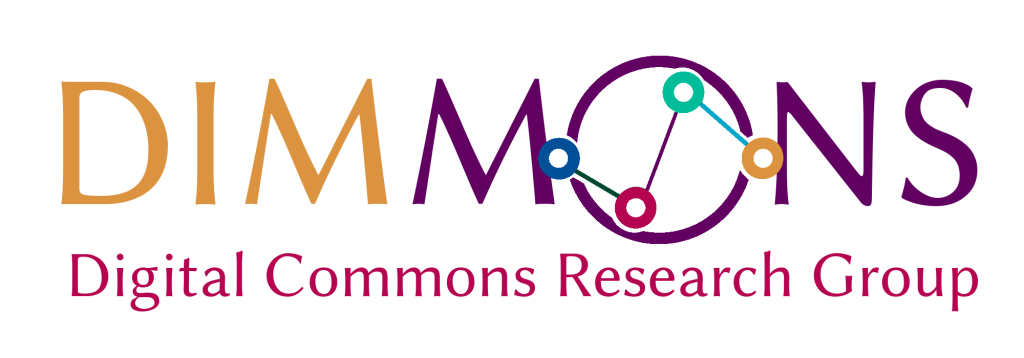
Dimmons mission:
«Fostering socioeconomic and gender innovation through research, methodological experimentation and action for a commons oriented society»
Dimmons’ action-research approach
The Dimmons research group focuses on socio economic and gender innovation connected to the challenges and opportunities open up by the digital revolution sphere, and more concretely, on collaborative economy and the commons. Other terms adopted on certain occasions to refer to these topics are social innovation, common based peer production (CBPP), platform/open cooperativism, or sharing economy. These phenomena are approached from three perspectives:
- Economics: Emergence and economic implications of collaborative production, the configuration of a new production model based on open knowledge, level of economic activity and business models.
- Public policies: Policy co-creation and political innovation in emerging areas of public policy, and conflict and social mobilization associated with the regulations of socio economic innovation.
- Methodological innovations and future studies: Open science and methodological innovation emerging from collaborative economy applied to research and other ambits. Governance dilemmas and potential scenarios linked to highly innovative frontiers opened up by technological development.
In relation to those objectives, Dimmons is also aligned with different Sustainable Development Goals (SDGs) set by the United Nations in 2015. Specially with goal number 8: Promote inclusive and sustainable economic growth, employment and decent work for all, and goal 5: Achieve gender equality and empower all women and girls.
Dimmons is a SGR Group (“consolidated research group” oficially recognized by AGAUR, research agency from the Catalan Generalitat Goverment) with registration number 2021 SGR 01383.
Guiding principles:




Action-oriented: Oriented to drive action and advance change in the resolution of social challenges.
- Research to inform and improve the design of organisational processes, economic models, policies, legal issues and technology.
- Economic impact of research, favouring the exploration of results and a transition towards an economy that puts people at the centre.
- Promoting an empowering and sustainable relationship with technology.
Research excellence and quality: High research performance, talent and rigour.
Transdisciplinarity to tackle challenges from diverse perspectives.
- Mission-oriented research rather than method- or discipline-oriented.
- Considering socioeconomic, gender and environmental perspectives.
Methodological pluralism and experimentation (intensive use of co-creation, collaborative, visual and data-oriented methods).
- Research management innovation: exploring agile methods, mutual care and gender dynamics.
Open knowledge
- Lean approach, reproducibility and multi-target communication.
- Publications in open access, whether in academic journals or pre/post-print repositories.
- Publication of open datasets and research toolkits.
Transparency: Public, transparent and accountable processes regarding partners, impact, and sources of funding.
Knowledge co-creation: Openness as part of a collaborative ecosystem (versus closed group, “ivory-tower style”).
- Favouring an ecosystem of plural modes of engagement.
- Intense effort dedicated to disseminating and creating relations and fostering community building.
- Collaborations with civil society, policymakers, economic actors and other research institutions.
Glocal: Global and local alliances, perspectives and links to Barcelona, Catalonia and internationally.
